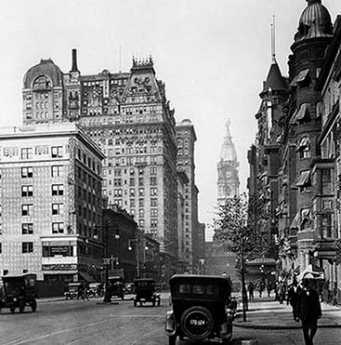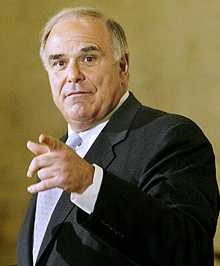Related Topics
Philadelphia Politics
Originally, politics had to do with the Proprietors, then the immigrants, then the King of England, then the establishment of the nation. Philadelphia first perfected the big-city political machine, which centers on bulk payments from utilities to the boss politician rather than small graft payments to individual office holders. More efficient that way.
Medical Economics
Some Philadelphia physicians are contributors to current national debates on the financing of medical care.
Philadelphia Economics
economics
Conventions and Convention Centers
When you have a big convention center, some circus is always coming to town. Philadelphia has always been a convention town, has had and still has lots of convention sites, and hopes to have more of the kind of famous convention we have had in the past.
War Dance
History Footnote: Before the white man came, the Iroquois "nation"devised rules still characteristic of our modern political parties. At various times, there were five, six, or seven tribes in the Iroquois confederacy headquartered in upstate New York, allied to each other with fluctuating loyalty. Philadelphia's tribe were Delawares or Leni Lenape, but the most warlike and dominant tribe were the Mohawks. Confederations work best when allied against a common foe. The rest of the time, member tribes mostly beat and cheat each other.
The Philadelphia Democratic Party appeals to a number of minority groups and recent immigrants, but it is more meaningful to think in terms of players. For example, university professors are mostly Democrats, but the teachers union is an active political player. Minorities generally vote Democratic, but the Black Ministers are players. Lawyers are rather evenly divided between Republicans and Democrats, but Plaintiff Trial Lawyers, the ones who sue people for a share of the award, are players.
Some people are players but keep it quiet. Certain rich donors are players but don't want to be known as such. The chiropractors and optometrists claim to be players but would rather not have the truth known. The news media and utility companies come close to denying they are players in spite of abundant evidence otherwise.
Well, the local players had a war dance just before the November 2005 elections; the timing was no accident, and it was publicly described as a SEPTA contract negotiation. The issues had mostly been settled in advance, but the real deal-breaker was health benefits, Blue Cross health insurance paid by the employer to escape income tax and to make the pay packet appear smaller to the taxpayers. Step by step for twenty-five years, employers in the form of the Republican politicians had been keeping up a steady drumbeat, trying to reduce the incentive to overspend health insurance because it seemed free, with resulting increase in employer costs. Slowly, business management convinced a majority of the public that "first-dollar coverage" was a villain, since the person covered by the insurance has no skin in the game. Even party loyalists had to admit that it looked as though the tax exemption of health insurance was injuring the image of labor. That concept carried the slogan of "sending jobs to China", or killing the goose that lays golden eggs in the Rust Belt. Five million Health Savings Accounts were sold in 2005 in spite of state laws hampering this form of health insurance, and from experience it seemed certain that five times that many would be sold if early-adopters reported satisfaction. The surrogate was deductibles and employee contribution to health insurance; just about everybody recognizes the need to make some token contribution to health insurance in order to have skin in the game and keep costs down. But not the SEPTA workers. In 2005, the brotherhood of Septa workers would go on strike for fifty days rather than pay one penny of "give-back" for health insurance. Their energy level was high, they were waving their arms, they were ready to overturn ashcans.

|
| Bellevue |
When union contract negotiations go on for days, all day, the public gets an idea the negotiating table is a shouting match the whole time, with "negotiators" carrying on with tom-toms and tomahawks in an even more physical and extreme model for their supporters on the street corners. For about ten minutes a day, that's true. But then the television people can turn off their lights and the war hawks fan out to talk with their supporters outside the room, which in this case happened to be in the Bellevue Stratford Hotel. Perhaps you didn't know the Pennsylvania Governor has quite a nice set of offices there. Perhaps you haven't noticed that all the parking spaces on the side alleys near the Bellevue "belong" to various politicians. Just try parking there yourself to learn a few facts of Philadelphia life.
In negotiating classes, they teach you never to make the first concession. By that reasoning, no negotiation would ever end. The more practical advice is to forget about any serious bargains until the last day of the contract, or even a couple of days after that. The hard reality is that no one will make a concession while there is time for some invisible player to back out; no one wants to give his constituents time to realize he has sold out their trust or violated their loud, insistent, wholly unrealistic demands. And so in 2005, after the shouting had gone on for some time, and even a real strike began, the Governor finally sauntered into his nice Philadelphia office. Time to get to work.

|
| Ed Rendell |
Those who didn't know him made the comment they could almost believe he was a victim of Attention Deficit Disorder. He talked all the time, moved all the time, and apparently showered all the time. That is, he was in and out of sight all night, but invariably reappeared with fresh shirts, clean shaves, and sharp creases. His aides confided he wasn't very good at "detail work", which is to say he conducted the whole affair on a primeval level of dominance, bluster, charm and implied threat. Don't bother me with facts. Mayor Street, on the other hand, would come in and mumble something incoherent, and then had to leave for an important engagement. Word came in that the school teachers felt they really had to pay a small health insurance deductible, and it wasn't so bad. Foo, no guts.
Somewhere along the line, the newspapers started to echo that deductibles had their merits. Foo, bunch of Communists. The black ministers were reported to feel that if their people all had to pay deductibles, why couldn't the transit workers. Bah, bunch of muddleheads. In the hubbub, someone asked what Andy Stern thought. The trial lawyers didn't have as much to say as they once did; SEPTA had reduced liability costs by $87 million through adamantly refusing to settle any case without going to court. Paper tigers. What about chiropractic benefits, we demand the inclusion of chiropractic benefits. No, said SEPTA, we aren't going to agree to any of that sort of thing. Well, what about twenty visits a year to chiropractors?
One by one, the other players deserted the SEPTA workers. The message from the other tribes in the confederation seemed to be, get what you can for SEPTA, but stop the strike by election day. The Governor produced the razzle-dazzle, a loan to the city to pre-pay the Blue Cross premium, in return for which Blue Cross would reduce the premium. The effect of that was to produce enough cash to appear to add ten cents an hour to the pay packet. We'll have to wait a year to see how this money gets restored to Blue Cross, but that's the general idea.
The strike was over, hurray. The next day, the Democrat party elected Democratic governors in New Jersey and Virginia, defeated some California amendments which would have hurt the trial lawyers and teachers unions. Surely, someone in the Democrat party nationally was telling himself that caving on the Philadelphia transit strike was a small price to pay for that.
Originally published: Monday, June 19, 2006; most-recently modified: Sunday, July 21, 2019
| Posted by: G4 | Jun 20, 2006 11:21 AM |
Readers will get distracted by your words, angy and hurt in fact, and miss & disregard your point.
Plus, you risk being labeled a bigot or a crackpot and lose all credibility.